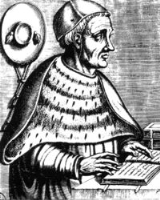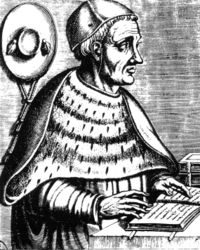
Pierre d'Ailly
Encyclopedia

France
The French Republic , The French Republic , The French Republic , (commonly known as France , is a unitary semi-presidential republic in Western Europe with several overseas territories and islands located on other continents and in the Indian, Pacific, and Atlantic oceans. Metropolitan France...
theologian
Theology
Theology is the systematic and rational study of religion and its influences and of the nature of religious truths, or the learned profession acquired by completing specialized training in religious studies, usually at a university or school of divinity or seminary.-Definition:Augustine of Hippo...
, astrologer
Astrologer
An astrologer practices one or more forms of astrology. Typically an astrologer draws a horoscope for the time of an event, such as a person's birth, and interprets celestial points and their placements at the time of the event to better understand someone, determine the auspiciousness of an...
, and cardinal
Cardinal (Catholicism)
A cardinal is a senior ecclesiastical official, usually an ordained bishop, and ecclesiastical prince of the Catholic Church. They are collectively known as the College of Cardinals, which as a body elects a new pope. The duties of the cardinals include attending the meetings of the College and...
of the Roman Catholic Church
Roman Catholic Church
The Catholic Church, also known as the Roman Catholic Church, is the world's largest Christian church, with over a billion members. Led by the Pope, it defines its mission as spreading the gospel of Jesus Christ, administering the sacraments and exercising charity...
.
D'Ailly was born in Compiègne
Compiègne
Compiègne is a city in northern France. It is designated municipally as a commune within the département of Oise.The city is located along the Oise River...
in 1350 or 1351 of a prosperous bourgeois family. D'Ailly studied in Paris, receiving the licentiate in arts in 1367 and the masters a year later. He was active in university affairs by 1372. D'Ailly taught the Bible in 1375 and the Sentences of Peter Lombard
Peter Lombard
Peter Lombard was a scholastic theologian and bishop and author of Four Books of Sentences, which became the standard textbook of theology, for which he is also known as Magister Sententiarum-Biography:Peter Lombard was born in Lumellogno , in...
in 1376–1377. D'Ailly received the licentiate and doctorate in theology in 1381. He was affiliated with the Collège de Navarre
Collège de Navarre
The College of Navarre was one of the colleges of the historic University of Paris, rivaling the Sorbonne and renowned for its library. It was founded by Queen Joan I of Navarre in 1305, who provided for three departments, the arts with 20 students, philosophy with 30 and theology with 20...
, University of Paris
University of Paris
The University of Paris was a university located in Paris, France and one of the earliest to be established in Europe. It was founded in the mid 12th century, and officially recognized as a university probably between 1160 and 1250...
, serving as rector in 1384, At the College, he taught Jean Gerson
Jean Gerson
Jean Charlier de Gerson , French scholar, educator, reformer, and poet, Chancellor of the University of Paris, a guiding light of the conciliar movement and one of the most prominent theologians at the Council of Constance, was born at the village of Gerson, in the bishopric of Reims in...
and Nicholas of Clémanges
Nicholas of Clemanges
Mathieu-Nicolas Poillevillain de Clémanges was a French humanist and theologian....
.
D'Ailly rose to prominence by leading the university's effort to secure removal of John Blanchard as chancellor
Chancellor of the University of Paris
The Chancellor of the University of Paris was originally the chancellor of the chapter of Notre Dame de Paris. The University of Paris ceased to exist in 1970, though the related position, Chancellor of the Universities of Paris is currently held by Maurice Quénet.-13th century:*Praepositinus...
. Blanchard was accused by d'Ailly before the Avignon antipope Clement VII
Antipope Clement VII
Robert of Geneva was elected to the papacy as Pope Clement VII by the French cardinals who opposed Urban VI, and was the first Avignon antipope of the Western Schism.-Biography:...
of abuse of office. D'Ailly served as chancellor of the University from 1389 to 1395, and Gerson succeeded him. Both were involved expelling the Dominican Order
Dominican Order
The Order of Preachers , after the 15th century more commonly known as the Dominican Order or Dominicans, is a Catholic religious order founded by Saint Dominic and approved by Pope Honorius III on 22 December 1216 in France...
from the university for refusing to embrace the idea of the Virgin Mary's Immaculate Conception
Immaculate Conception
The Immaculate Conception of Mary is a dogma of the Roman Catholic Church, according to which the Virgin Mary was conceived without any stain of original sin. It is one of the four dogmata in Roman Catholic Mariology...
and in the effort to end the Great Schism by means of an ecumenical council
Ecumenical council
An ecumenical council is a conference of ecclesiastical dignitaries and theological experts convened to discuss and settle matters of Church doctrine and practice....
. D'Ailly, although slow at first the embrace the conciliar solution to the Schism, participated in both the Council of Pisa
Council of Pisa
The Council of Pisa was an unrecognized ecumenical council of the Catholic Church held in 1409 that attempted to end the Western Schism by deposing Benedict XIII and Gregory XII...
(1409) and the Council of Constance
Council of Constance
The Council of Constance is the 15th ecumenical council recognized by the Roman Catholic Church, held from 1414 to 1418. The council ended the Three-Popes Controversy, by deposing or accepting the resignation of the remaining Papal claimants and electing Pope Martin V.The Council also condemned and...
(1414–1418). With Gerson, d'Ailly was one of the leading theologians at the Council of Constance.
D'Ailly's ecclesiastical career prospered. He served as bishop of Le Puy, bishop of Noyon, and bishop of Cambrai. The antipope John XXIII
Antipope John XXIII
Baldassarre Cossa was Pope John XXIII during the Western Schism. The Catholic Church regards him as an antipope.-Biography:...
made him a cardinal in 1411. He became known as the Cardinal of Cambrai. D'Ailly also was a royal chaplain and almoner
Almoner
An almoner is a chaplain or church officer who originally was in charge of distributing cash to the deserving poor.Historically, almoners were Christian religious functionaries whose duty was to distribute alms to the poor. Monasteries were required to spend one tenth of their income in charity to...
. This acceptability to many interests helps explain his advancement.
D'Ailly wrote extensively on the Schism, reform, astrology and other topics. His ideas on the powers of the college of cardinals
College of Cardinals
The College of Cardinals is the body of all cardinals of the Catholic Church.A function of the college is to advise the pope about church matters when he summons them to an ordinary consistory. It also convenes on the death or abdication of a pope as a papal conclave to elect a successor...
and the infallibility
Infallibility
Infallibility, from Latin origin , is a term with a variety of meanings related to knowing truth with certainty.-In common speech:...
of the general council were very influential. D'Ailly's Imago Mundi (1410), a work of cosmography
Cosmography
Cosmography is the science that maps the general features of the universe, describing both heaven and Earth...
, influenced Christopher Columbus
Christopher Columbus
Christopher Columbus was an explorer, colonizer, and navigator, born in the Republic of Genoa, in northwestern Italy. Under the auspices of the Catholic Monarchs of Spain, he completed four voyages across the Atlantic Ocean that led to general European awareness of the American continents in the...
in his estimates of the size of world land-mass. His views on astrology, expressed in several works, attempted to balance divine omniscience and human free will
Free will
"To make my own decisions whether I am successful or not due to uncontrollable forces" -Troy MorrisonA pragmatic definition of free willFree will is the ability of agents to make choices free from certain kinds of constraints. The existence of free will and its exact nature and definition have long...
. D'Ailly's writings on the Schism put the crisis and the need for reform into an apocalyptic context. His astrology also was tied to the Schism, attempting to determine whether the division of the church was a sign of the coming of the Antichrist
Antichrist
The term or title antichrist, in Christian theology, refers to a leader who fulfills Biblical prophecies concerning an adversary of Christ, while resembling him in a deceptive manner...
.
After the council, d'Ailly returned to Paris. When the Burgundian faction in France's civil discord seized Paris in 1419, killing some professors in the process, he fled south and retired to Avignon
Avignon
Avignon is a French commune in southeastern France in the départment of the Vaucluse bordered by the left bank of the Rhône river. Of the 94,787 inhabitants of the city on 1 January 2010, 12 000 live in the ancient town centre surrounded by its medieval ramparts.Often referred to as the...
. His former pupil Gerson settled nearby at a house of the Celestine Order. D'Ailly, known as the Cardinal of Cambrai, died in 1420. His works began appearing in print before the end of the fifteenth century.
The crater Aliacensis
Aliacensis (crater)
Aliacensis is a lunar impact crater that is located in the rugged southern highlands of the Moon. The crater Werner is located just to the north-northwest, and a narrow, rugged valley lies between the two comparably sized formations. To the southwest is Walther, and Apianus is to the northeast. The...
on the Moon is named after him.
Further reading
- Alan E. Bernstein, Pierre d'Ailly and the Blanchard affair : University and Chancellor of Paris at the beginning of the Great Schism. Leiden: Brill, 1978.
- Bernard Guenée, Between Church and State: The Lives of Four French Prelates in the Late Middle Ages, Translated by Arthur Goldhammer, Chicago: University of Chicago Press, 1991.
- Francis Oakley, Political Thought of Pierre d’Ailly: The Voluntarist Tradition (New Haven: Yale University Press, 1964)
- Louis B. Pascoe, Church and Reform: Bishops, Theologians, and Canon Lawyers in the Thought of Pierre d'Ailly (1351-1420). Leiden: Brill, 2005.
- Laura A. Smoller, History, Prophecy, and the Stars: The Christian Astrology of Pierre D'Ailly, 1350-1420. Princeton University Press (Princeton, NJ; 1994) ISBN 0-691-08788-1.
- Philip H. Stump, The Reforms of the Council of Constance (1414-1418), Leiden: Brill, 1994. ISBN 90-04-09930-1
- Pierre D'Ailly Imago Mundi

